- McCardell Bicentennial Hall
- Organic Farm
- Franklin Center at Hillcrest
- Simple Window Modal
- Biomass
- Bill McKibben
- Willow Project
- Willow Project
- Weybridge House
- Recycling Center
- Sunday Night Group
- Field House
- Dining
- Compost
- Solar Decathlon
- Davis Family Library
- Make Neutrality a Reality
- Electric car
- Atwater
- Residential Sustainability Coordinators
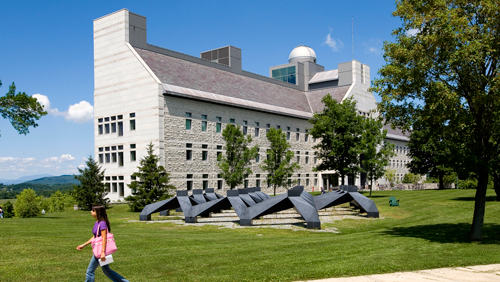
McCardell Bicentennial Hall
- Finished woodwork was grown and harvested sustainably through the local Vermont Family Forests program.
- Recycled-plastic lumber was used on the flat roof and locally mined slate was used on the remaining roof.
- Daylight penetrates the vast majority of spaces in the building, creating a pleasant work environment and also reducing the need for artificial lighting during the day.
- Night-sky light pollution is minimized through the use of automatic window shades on windows at dusk and directional lighting in the parking area.
- Solar-powered lights illuminate the Bicentennial Hall parking lot.
- Flooring is made up of sealed concrete or Linoleum made from renewable resources—solidified linseed oil and wood flour or cork dust, instead of petroleum-based vinyl.
Organic Farm
The Middlebury College Organic Farm is a student organization that maintains a three-acre plot of fruits and vegetables. The produce reflects a balance between efficient, profitable crops and more labor intensive, less productive crops grown for educational purposes.
Located west of the College on Route 125, the farm supplies produce to Middlebury College dining halls, local restaurants and delis, and Weybridge House, the College’s environmental studies academic interest house.�
Franklin Center at Hillcrest
The LEED Platinum certified Franklin Environmental Center at Hillcrest is home to our Environmental Affairs Office, Environmental Studies Program, Sustainability Integration Office, and Fellowships in Environmental Journalism. This renovated 19th-century farmhouse uses 47 percent less energy than a standard building of the same size. Other sustainability features include Forest Stewardship Council (FSC) certified wood, groundwater exchange air-conditioning, energy efficient windows and lights, low-flow faucets, and solar panels.�
Bike Shop
One of the ways we can move away from a car culture is to move toward a bike culture. The campus bike shop helps people learn how to fix and maintain their bikes and provides all the tools and work space they need—free of charge!
Biomass Plant
Middlebury’s biomass gasification plant marks a significant milestone toward the College’s goal of becoming carbon neutral by 2016. Students, staff, and faculty from many different departments across campus were involved at every stage of this project. The plant, which burns regionally grown wood chips, has helped the college replace a million gallons of fuel oil annually.
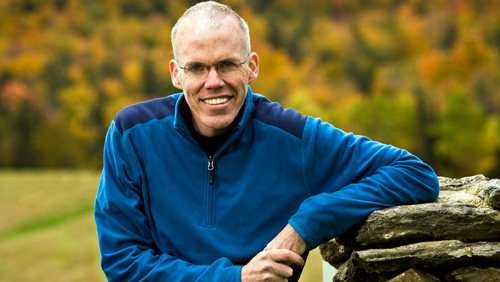
Bill McKibben
Environmentalist and best-selling author Bill McKibben is Schumann Distinguished Scholar at Middlebury College. Bill is a regular presence around campus, and he has been deeply involved with developing student activism around climate change, including working with the groups Step It Up and 350.org. He is also one of the staff members for Middlebury’s Fellowships in Environmental Journalism.�
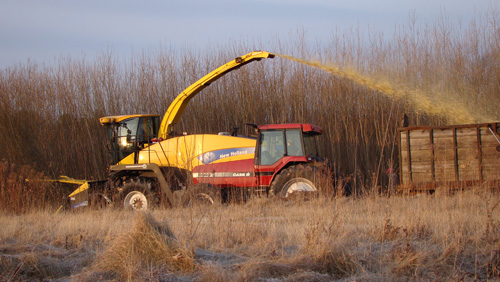
Willow Project
Middlebury is exploring the potential for growing a portion of its own biomass supply. The College has partnered with the State University of New York of Environmental Science and Forestry to test the feasibility of growing willow shrubs on Middlebury College land. The 10-acre plot tests multiple varieties of willow shrubs and different cultivation methods to see which might work to supply chips to our biomass plant.
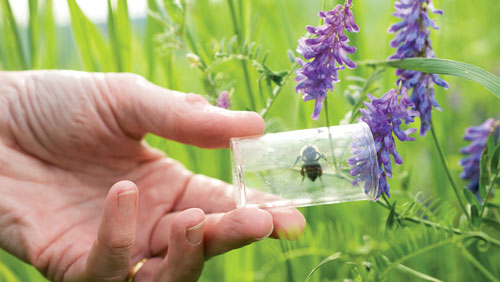
No Mow
Grounds crews have reduced the amount of College lawn they mow by 20 acres, allowing pockets of the landscape to return to flower-filled meadows. This saves an estimated 1,000 hours of labor, 670 gallons of fuel, and six tons of CO2 emissions annually. Additionally, the no-mow zones have created new living laboratories for biology research on pollinating insects, conducted by faculty and students.
Weybridge House
The campus environmental interest house gives students the opportunity to practice lived environmentalism, putting many of the ideas they learn in the classroom into action. Four nights a week, residents of Weybridge House serve all-local dinners, open to anyone in the campus community.
Recycling Center
- Middlebury diverts about 65 percent of its waste from landfills through recycling, reuse, and composting. We recycle plastics, glass, and paper, as well as electronics, CFL bulbs, and other less conventional recyclables. Items left behind after students move out are brought to the center and stored in a reuse trailer, which is open to the College community. You can find dishes, binders, clothing, furniture, electronics, and much more in the reuse trailer!
- One hundred percent of pre and post-consumer food waste from dining halls as well as paper napkins, are composted on campus. There are also compost bins being installed in several of the dorms on campus. We make more than 300 tons per year, and it is used on campus and at the organic farm.
- Approximately 15 percent of the power used in the center comes from the wind turbine right outside.
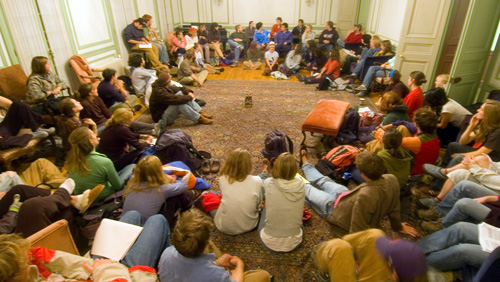
Sunday Night Group
Every Sunday night at 9 p.m. in the Grand Salon of Le Château, student activists (all are welcome) gather to discuss and plan action for issues related to sustainability in its many forms. This group has been highly influential in shaping the College’s sustainability focus, including the initiative to become
carbon neutral by 2016.�
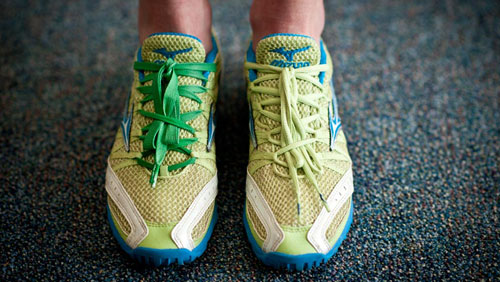
Athletics
Middlebury has its own athletic-sustainability coordinator and a student leader on every team to work on sustainability for each sport. As a department, athletics continually looks for opportunities to cut its footprint—from practicing carbon-neutral travel to reducing waste at sporting events. At the individual level, we encourage all of our student athletes to make a personal promise of sustainability in their lives through the national Green Laces program.
-
Dining
Middlebury incorporates organic products into the campus cuisine on an ongoing basis. Dining Services works directly with farmers and local produce distributors to increase the amount of local produce used in the dining halls, recognizing the potential income they can offer farmers by steering more of the College’s annual produce purchases toward local growers. They also work with the Middlebury College Organic Farm to purchase seasonal fruits and vegetables and are integral partners in the College’s composting program.�

Compost
Middlebury makes 1,500 cubic yards (300 tons!) of compost each year from dining hall food waste mixed with wood chips and manure from the nearby Morgan Horse Farm. The rich, dark compost is used in the College farm, for landscaping needs on campus, and on the athletic fields. The composting operation helps divert many tons of waste that would have otherwise gone to landfills.�
Solar Decathlon House�
A team of Middlebury students competed in the 2011 U.S. Department of Energy Solar Decathlon. This biennial competition challenges the 20 best teams from around the world to design and build a 650-1,000-square-foot solar-powered house. Our team was the only one selected from a liberal arts school and we competed against teams from large research institutions. After the competition on the National Mall in Washington, D.C., the house was returned to Middlebury and reassembled on the campus as a residence for students.�
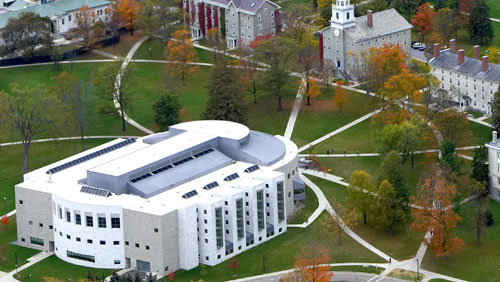
Davis Family Library
Built in 2004, the Davis Family Library has numerous sustainability features incorporated into its design:�
- Natural light from windows and skylights, energy-efficient lighting, and sensors are used to minimize electricity use.
- Of the 150,000 board feet of Vermont-harvested hardwood used to build the library, 70 percent came from the College’s Bread Loaf certified forest lands.
- Middlebury hired Vermont furniture makers to craft reading tables and chairs, tables for group-study rooms, and desk furnishings using certified Vermont maple.
- Storm water is managed through a system of collection areas, swales, and wet meadows, which cleans the runoff, reduces its volume, and protects downstream areas.�
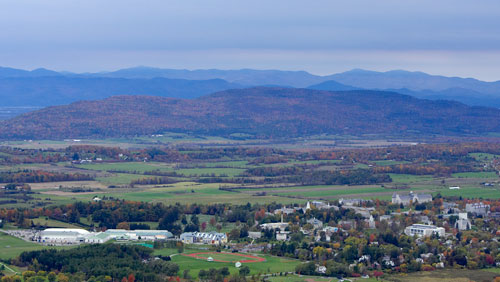
Make Neutrality a Reality
At Middlebury we are increasing our use of renewable energy and improving energy conservation to reach our goal of carbon neutrality by 2016. This huge undertaking involves students, staff, and faculty from across the college.
In addition to recent campus projects such as the new biomass gasification plant and energy efficiency upgrades in McCullough and Proctor, many others are working on these issues. The Nordic ski team converted its truck to run on waste veggie oil from the dining halls, the Snow Bowl is the first carbon neutral ski area in the country, Facilities Services uses sustainable landscape practices, and alumni are at the forefront of climate activism.
Climate change poses a great threat to our planet. By reducing carbon dioxide emissions on campus we will limit our own contributions to this problem, and we hope to inspire others to do the same.�
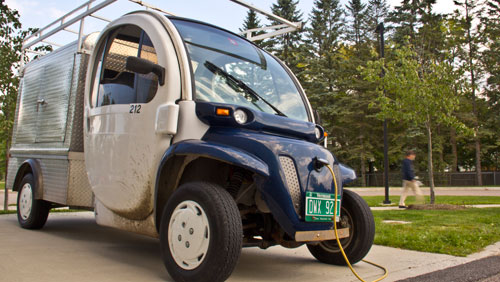
Electric car
Library staff calls it “the bug,” but we’re not sure why. What we know for certain is that this small electric truck, used to transport media equipment all around campus, saves a huge number of personal car trips, which helps cut our CO2 emissions on campus.
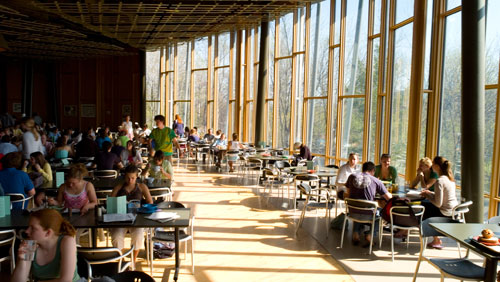
Atwater
Atwater Commons is a great example of sustainable design on Middlebury’s campus. Both the dining hall and the newest residence halls were designed with sustainability as a high priority without sacrificing functionality or comfort. Atwater dining hall, a beautiful and comfortable space flooded with natural light, has a “green” roof to help keep it cool in summer and warm in winter. �
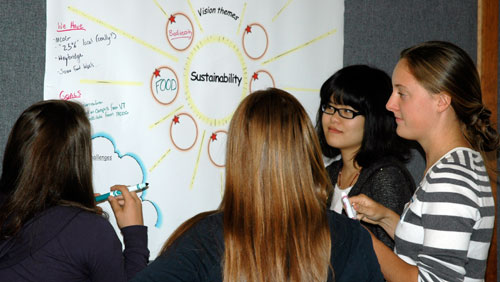
Residential Sustainability Coordinators
Every student can make a difference by developing sustainable habits in the residence halls. To help out, each commons at Middlebury has a group of students who work to inspire their peers to live more sustainably on campus through tips, communications, and fun programs that highlight sustainability issues in day-to-day life. Some of the recent programs include candlelit dinners in the dining halls to raise awareness about energy conservation, “sustainable snack night,” and an Earth Day festival.� �